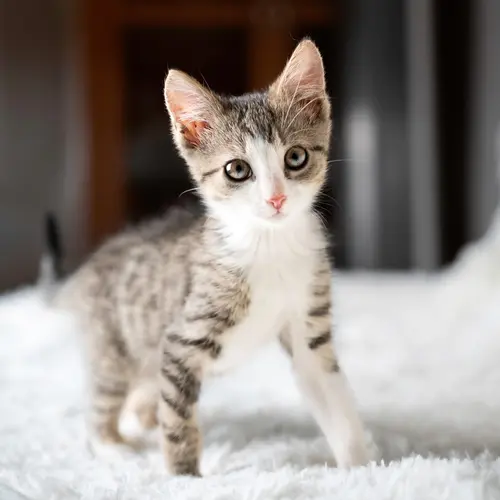Gerbils are omnivores who enjoy a wide variety of seeds, fruits, vegetables, and insects. Commercial pellet mixes provide your gerbils with the nutrients they need. A proper selection of natural produce can be a healthy alternative to store-bought mixes, a tasty treat, or a supplement to their conventional diet.
Gerbils are active pets who love to chew and forage. Providing them with a variety of diet options around their cage can keep them entertained and turn mealtime into a game of foraging.
Commercial Diet Options
Whatever your choice of commercial food, it must meet a few requirements to provide your gerbil with adequate nutrients. It’s recommended that the mix contains around 14% protein. Anything less than that will likely need to be supplemented with other sources of protein, such as insects. Some sources recommend more or less protein. If you’re unsure, consult your vet about your gerbil’s needs.
Seed mixes, while a good source of protein, can also be high in fat. Make sure your mix has a fat content between 6% and 8% so your gerbil doesn’t put on excess weight. Certain seeds, like sunflower seeds, are high in fat content but are also tasty, so your gerbil may pick these out first. Replacing fatty seeds with healthier alternatives, such as pumpkin seeds, can help you manage your gerbil’s weight.
Regular Diet Supplements
You can give your gerbil some variety alongside their normal commercial mix using an assortment of fruits, vegetables, and small insects. On occasion, you can even feed your gerbil pasta.
These supplemental foods should be given in moderation. Feeding large amounts of fruits, vegetables, or grains to your gerbil can cause digestive troubles, like diarrhea, while sugary treats can cause diabetes.
You can safely give your gerbil the following veggies daily:
- Timothy hay
- Kale
- Romaine lettuce
- Beet greens
- Spinach
- Broccoli
- Peas
- Cooked sweet potatoes
- Carrots
Additionally, some gerbils enjoy eating corn even though it doesn’t provide much nutrition.
You can safely give your gerbil a bite-sized amount of these fruits every other day:
- Pears
- Melon
- Apples
- Oranges
- Blueberries
- Strawberries
The following grains and seeds can also be added to supplement the normal mix:
- Regular oats
- Dry pasta
- Millet
For extra protein, your gerbil can also eat:
- Boiled or scrambled eggs
- Mealworms
- Crickets
- Waxworms
Your gerbil will hoard food for later. They often bury food in the nooks and crannies of their cage or under the shredded paper on the floor, but they won't remember where it is after a few hours. The food will rot after a period of time if you don't realize it was hidden. You should regularly spot-clean your gerbil’s habitat to clean out any stored food before it becomes rotten and harmful to you or your pet.
Treats
Like with other pets, you should control the number of treats you give your gerbil. You can opt to use fruits and veggies to provide a more natural, healthy treat.
You can purchase commercial treats that your gerbil will like, but they should only make up a small fraction of your gerbil’s diet. Many treats have extra fat that can make your gerbil overweight. Save these for special occasions.
Chewing and Gnawing
Gerbils are energetic pets that need engagement. Along with plenty of climbing features, they need things to chew on. Fixtures made of cardboard and soft paper will get torn apart, but they’ll ultimately become part of the cage's substrate.
Certain items are safe for gerbils to chew, such as:
- Banana leaves
- Cardboard from food packaging
- Coconut shells
- Untreated softwood
- Hay cubes
Foods to Avoid
As with many animals, gerbils cannot process certain types of food. Avoid feeding these foods to your gerbil, as they are dangerous or toxic:
- Rhubarb
- Chocolate
- Beans
- Citrus fruits
- Grapes
- Onions
Before giving your gerbil anything besides their conventional food mix, consult your vet.
Water
Gerbils need constant access to clean fresh water provided from an upright bottle with a metal sipping tube. To keep the water clean, change it daily and regularly clean the drinking tube.
It is recommended that you use chlorine-free water. Not all tap water is properly treated and may contain chlorine or heavy metals. An alternative to a filtration system is to use bottled drinking water or tap water that has sat in an open container for at least 24 hours.
Feeding Routine
Like any other pet, your gerbil should have a feeding routine. The specific mix you feed them will have serving instructions and proper portion sizes. You can expect to feed your gerbil about once a day. However, they’ll let you know when they’re hungry by digging into their substrate to search for food.
This is a natural instinct, as gerbils are foragers and enjoy hunting for their food. Rather than keeping a specific food dish in your gerbil's habitat, you can instead sprinkle the food onto the floor of their cage and let them hunt for it. They'll be more engaged and will be more likely to eat a larger variety of food, letting them get all the nutrients they need to stay healthy.

